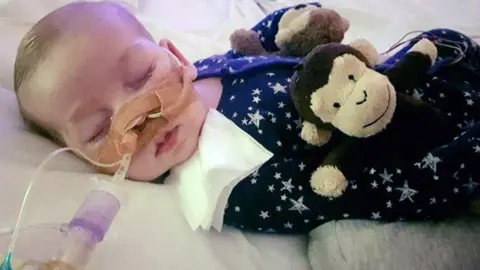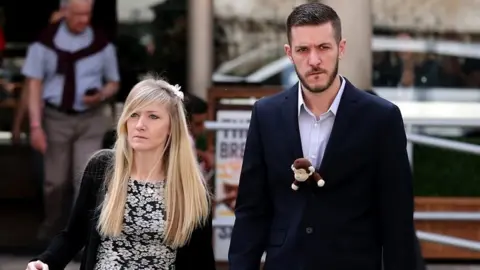Charlie Gard treatment must continue until next week, court rules
 PA
PATerminally-ill baby Charlie Gard must continue to receive life-support treatment until Tuesday, the European Court of Human Rights has said.
His parents, Chris Gard and Connie Yates, have launched a final legal challenge at the European court after their Supreme Court challenge failed.
They want the 10-month old to undergo a trial in the US, but London specialists believe he has no chance of survival.
The European court wants until Tuesday to consider the case.
Judges in Strasbourg, France, ruled that Charlie should receive treatment while they look at paperwork in the case.
The court said this type of interim measure was exceptional, when the applicants would face a "real risk of irreversible harm".
A spokeswoman said Charlie's parents wanted a panel of seven judges to look at the case in detail. No decisions about whether or not the case would be analysed at a hearing had yet been made, she said.
 PA
PACharlie has been in intensive care at Great Ormond Street Hospital since October last year.
He has mitochondrial depletion syndrome, a rare disorder that affects the genetic building blocks that give energy to cells.
Doctors say he cannot hear, move, cry or swallow and that his lungs only go up and down because he is on a machine that does it for him.
Specialists believe the US trial is experimental and will not improve his quality of life, and therefore he should be allowed to die with dignity.
Charlie's parents have exhausted all legal options in the UK.
'Not a cure'
On Tuesday, the High Court ruled that life-sustaining treatment could be withdrawn, and on Thursday, the Supreme Court rejected the parents' appeal against that decision.
The Supreme Court said parents were not entitled to insist on treatment which was not in their child's best interests.
Charlie is thought to be just one of 16 children in the world to suffer from mitochondrial depletion syndrome.
His parents have managed to raise £1.3m on a crowdfunding site to pay for the US treatment and to get him to the country safely, as a specialist plane and nurses are needed.
The American doctor who has agreed to treat Charlie has previously told the High Court the six-month therapy would be "treatment but not a cure".
The neurologist who would oversee the treatment told the court that while Charlie was in the "terminal stage" of his illness, treating him would be compassionate.
He added that there could be a meaningful improvement to his brain function meaning that he might be able to interact and smile.
